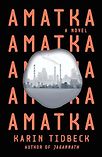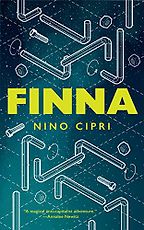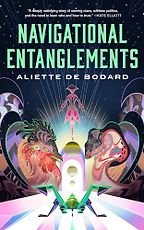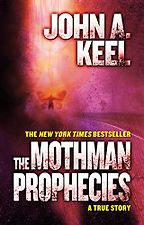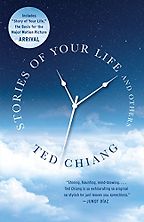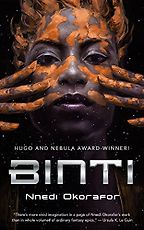Sci fi, and indeed all speculative fiction, is often associated with doorstopper books and long series. What are the advantages of a short novel?
They didn’t used to be doorstoppers, did they? When I was growing up, when I started reading science fiction, most of the novels were quite short. I remember seeing the Asimov Foundation novels, and they were enormous compared to the other science fiction that I read. So it didn’t used to be the norm, and most of the stuff that I read that’s from the 1950s, 60s, or 70s is about the same length or shorter than my novel Amatka – which has been described as almost not a novel because it’s so short. And it’s a normal-length novel! I think it’s about 55,000 words.
The advantage of short books in general is that I really hate bloated prose. When I write, I usually have to force myself to make things longer; I say one thing, then I think, “I’ve said this thing. I’m done. Let’s move on.” And someone will have to remind me that I probably should describe how someone looks, or describe something in more detail because I forget that people are not in my head all the time. So I’ve always been fighting with other people wanting to make my stuff longer. This is also a conflict that I stumbled into when I went to San Diego in 2010 for the Clarion Science Fiction and Fantasy Writers’ Workshop. My stuff was about 25% of the length of everyone else’s.
I come from a writing tradition that just formulates shorter stories. And I myself usually dislike most of the doorstoppers out there, because I don’t think that amount of words does the story any favours, a lot of the time. I’ve munched my way through a lot of doorstoppers, especially when I was in my teens and 20s. But these days, I don’t have the attention span, and I don’t have the energy, and I feel like a lot of people could benefit from cutting out 33% of all the words. The benefit of a short novel, or a short story in general, is that it delivers a punch – and it forces you to think about what’s going on, because you can’t zone out. If you zone out, you’ll miss it. It’s concentrated fruit juice for the brain.
Tell us about your first choice: Finna, by Nino Cipri.
I’m going to confess a bias, which is that I was a Swedish consultant for Finna; but I still find it a delightful story. I just re-read it ahead of this session, and it’s still amazing.
Ava and Jules are two people who work at a Scandinavian box store – it’s not IKEA, but it’s also not not IKEA – and they’re having a terrible time. Also, they just broke up with each other, and they’re trying to coexist at work when everything is sore and raw. Then a grandmother disappears into a wormhole in one of the showrooms – which the store has a routine for. Since Ava and Jules are the last ones to be employed by the company, it’s their job to go into the wormhole (in the store’s lingo this is a maskhål, which is Swedish for wormhole), and find the grandmother. And shenanigans ensue…
It’s a wonderful story about living under the crushing weight of capitalism and trying to stay sane. It’s also a very refreshing story, because it’s not often that you get a story where the first thing that happens is a breakup, and we see what happens in the aftermath. And also there’s a multiverse. There are vicious blonde Scandinavian clones who are out for your blood. There’s swashbuckling. There’s basically everything you would want in a novel… all in 134 pages. It’s perfect.
A whole multiverse in 134 pages is bold. How does Cipri construct so much in so little space?
What Nino Cipri does, very cleverly, is allude to other multiverses at the same time as stepping into one. This book also has the best exposition mechanic that I’ve seen for a long time, which is that there is a VHS tape with an introduction to wormholes in this box store – in Swedish, but dubbed over with English really badly. And Cipri describes things without over-inflating the prose: they say one thing, and then they’re done, and they move on to the next thing. They trust the reader to remember it, and to do some thinking for themselves. I think it’s very neatly done.
Could you tell us about your second choice? We’ve come to Navigational Entanglements, by Aliette de Bodard.
Aliette de Bodard is one of my new favourites in science fiction. She’s a French-Vietnamese writer – of science fiction, and also of fantasy and magical realism. This book is the kind of space opera that I really find myself hankering for.
It takes place in a far-future space civilization based on Vietnamese culture, where faster-than-light navigation through space is administered by clans. The main character, Việt Nhi, is a junior member of the Rooster clan. There are creatures that live in the interstitial spaces between jump points, which they call the hollows – very dangerous and frightening creatures – and one of these makes it out into our reality. Việt Nhi and the other juniors have to go and find it. There’s also a love story, which I absolutely adore.
This is also a very refreshing book. I grew up reading space opera when it was mostly manly men doing manly things, and they were all from Western civilizations. There were exceptions every now and then, but the bulk of it was having to suffer through white, straight cis men doing the dude stuff. You always knew how it would end, and you would get strange cultures, and they would always be parodies in a very colonialist fashion. One reason I enjoy reading both this and one we’re going to talk about later on, Binti, is that they’re not Western narratives, and I am still so thirsty for that. I want to promote Aliette’s books everywhere I go.
Both your choices so far have had a relationship arc at their heart. Is that easier or harder to do well in short books?
Well, I think all interesting science fiction is at least partly about relationships. There is the school of hard science fiction, which concerns itself with technology and visions of the future and weird stuff happening on distant planets and all that. But if there are not people in there who have feelings and thoughts and relationships to each other, it just feels like a role-playing game – “This is the world building I created. Enjoy it.” Nothing really happens in it, people don’t feel stuff, and it feels very dead.
As a contrast, when soft science fiction came along – and the fact that it was called ‘soft’ science fiction is very interesting – it centred on people and relationships. It not only asked “What is out there in space?”, but also “Who are we in space? And who are the other people in space?”. Because there are probably lots of people out there…
So I don’t think you can write an interesting story without writing about relationships. It doesn’t have to be love, it can be anything, but I find it quite dull if characters don’t relate to each other. And in shorter works you can get this concentrate of an interaction, of a relationship, without analysing it or dragging it out too long. You can get to the core of it: what is this relationship like? What are the stakes? Who are the people in it, and what is going on with them at the most important time in their lives? – because that’s usually where the book takes you.
The development of a romantic relationship in your own novel Amatka is incredibly deft – no words wasted. That’s true of everything in the novel. I’m curious about whether this was the result of intense planning or intense editing… Could you tell us a little about the book and your process?
Ah – it feels like the story of Amatka is longer than the book itself.
Amatka is set in a world where language literally controls matter. You have to tell objects what they are, and if you don’t, they will fall apart. The story is an exploration of what that does to society, and what happens when you stray from the type of very harsh social control that is required to keep everything in balance, so that everything doesn’t turn to goop – because that’s what happens.
This was originally based on dream notes. The whole process took seven years, which is why the story of the book coming to life is longer than the story itself. I had very weird dreams for a couple of years, and I wrote them down, and made it my project to try to draw a map of these dreams – because there were some locations that kept coming up again and again. I ended up with a map of my own dream continent that I visited at night. I wanted to write about this, and I realised that the best way to write about it would be poetry, because poetry is a way of talking about very complicated concepts in a very concrete way. So I wrote a poetry collection that no one wanted to publish. And I put it aside, and then I came back to it later on and turned it into a short prose collection – and no one wanted to buy that either. So I shelved it again. Then I came back to it, and I started writing some scenes as if it could be a novel. And I had maybe 30 or 40 pages when a publisher that I’d sold a short story to emailed me, and she said, “Would you happen to have a novel manuscript? – because I have an opening for you next autumn.” So I said, “Yes, of course, I have a novel. I’m just going to edit it…” I wrote the rest in four or five weeks in an absolute panic, and sent it in.
I’ve never written anything in that way before or after, and I do not recommend this process, because it took such a long time and so much energy; but eventually it was done, and I sold it to a Swedish publisher. There’s another round of this story, which is that it sold really badly in Sweden, which made me very angry. So I translated everything into English, and managed to get an agent interested in it; and she sold it to Penguin Random House, which is when it was edited again. So I had to rewrite it once more. I would rather chew my arm off than do that again. But I’m pretty happy with the end results.
That’s an amazing tale. In a way, it doesn’t surprise me, having read the final version… I think it’s sometimes the stories gestated for that long which are able come out that clean and spare.
You’re absolutely right. I knew the story I had on my hands by the time that editor asked me if I had a novel. I knew what was going to happen, I just had to sit down and write it.
You based fiction on your own strange dreams; let’s stay on the topic of our strange human experiences, and talk about your non-fiction choice. A really unusual one. Tell us about John Keel’s The Mothman Prophecies.
I picked this up when I was working in a science fiction bookshop twenty-five years ago. I didn’t know what it was, but I had been reading Fortean Times for several years, which is a magazine of paranormal phenomena and general weirdness. Forteana is named after a very strange man called Charles Fort who, 120 years ago, sat down in the archives of a newspaper and picked out every single strange thing that had been reported, and collected them into books. That gave rise to Forteanism. The philosophy is that you should be just as sceptical of modern science as you are of things like paranormal phenomena. Anything is possible. And The Mothman Prophecies by John Keel is very much in this tradition.
On one level, it is a story about people seeing this ‘mothman’ figure in West Virginia, and coupled with these sightings there are strange warnings that people get on telephones and the like, about a bridge that is going to collapse. But that’s just the story on the surface. It’s actually a vehicle for John Keel to rant about what he thinks reality is, and that’s what caught me.
It gets science fictional because he is very into aliens, alien encounters and alien abductions, and what it does to people who experience it. But the thing is, he’s not so sure that aliens come from outer space. He thinks we’re very possibly just being trolled by people who are right next to us, sort-of sideways on other frequencies. Because aliens act very much like fairies, don’t they? They show up, they take you away – instead of a mountain it’s to a UFO – and they do terrible things to you. And their logic seems to be very difficult to understand, just like fairies. The things they say and the things they do can be traced right back to fairy myths, and often UFO hotspots tend to be in the same places where people used to see fairies. He’s not sure what they’re actually doing here – it seems that a lot of the time these aliens, or fairies or cryptids or whatever, have an agenda that we cannot understand, and sometimes it seems like they’re just toying with us. They’re trolling us.
I am extremely agnostic when it comes to religion, and very agnostic when it comes to reality and how it works. So for me, this is the perfect science-fiction-folklore crossover book. But I must also warn you that if you choose to read this book, which is a biographical telling about this Mothman phenomenon, you also have to put up with John Keel ranting a lot.
Oh, I love this stuff. Have you come across the parallels between succubus encounters and alien encounters?
You’re talking about bedroom invaders and sleep paralysis, right? I’m actually touching on that in the story I’m writing right now. I’ve had sleep paralysis a couple of times, complete with people staring at me, which is not great…
So for you what exactly is the link between the strange experiences we have as humans, and what we’re up to when we invent science fiction?
My view of reality goes hand in hand with the stuff I write, because a lot of things I write are me having thought experiments about what could happen, either here or somewhere else. Amatka is often labelled a dystopia, but I never wrote it as a dystopia. I wrote it as a thought experiment. If you take a bunch of socialists from the 1970s and put them in an alien place, what’s going to happen to them as they try to survive, and what does that do to how they function, how they think?
I collect lots of paranormal phenomena and occultism and folklore. To me, it’s so interesting to dig into, because it’s not only about what’s out there, but also who we are and how we think about the world, and how those two are not quite separate. We live inside our own subjective realities. My distinct feeling about reality is that it’s quite flexible, while other people might live in realities that are very materialistic and concrete… These things flow directly into my writing.
Your next choice won the Nebula for best novella, and now features in a collection: could you tell us about the titular novella of Ted Chiang’s Stories of Your Life and Others?
Stories of Your Life is about a linguist, Louise Banks, who is hired to help study the language of aliens who have just arrived. And that’s basically it. That’s why I love the story so much. She studies the aliens and tries to communicate with them; she succeeds, and in the process, she is fundamentally changed – because understanding these other people’s language changes the way her mind functions, and changes her life entirely. It changes the way she approaches the past, the present, the future, free will and choices – and how she chooses to live her life, despite maybe knowing more about how it works.
One thing that I really enjoy about this story: it’s about a bunch of competent people who work together with aliens in a friendly and civilized way, and then the aliens go away, and nothing terrible happens. Something is fundamentally changed, but people are being basically reasonable. That’s refreshing. It’s very nice to see experts from two different species meet up, figure out how to talk to each other, and then go their separate ways. Nothing changes and everything changes.
The story might be familiar to some readers as the film Arrival. Did the film do it justice?
I’ve seen it twice, and I really liked it. Obviously, they made some changes, because you can’t do a one-to-one translation of literature to film, it doesn’t work like that. There was some stuff that I wasn’t too keen on, that had to do with how they translated the relationship between Louise and the other scientists, because to me it got a bit too cute. But in general, I thought it was a very good film.
That’s a nice change: so often real fans of a book hate the film.
I think a lot of people expect what’s in their own head to show up on the screen. Making a piece of cinema and writing a book are two such different processes that you cannot expect it to fulfil your wishes. I’ve had a couple of my stories turned into short films, and because I’m aware of this, I said, “Just do your thing. As long as you stick to some core values, do your interpretation – it’s going to be great.” And it has been great.
We see more cross-species contact in your final choice: Binti, by Nnedi Okorafor. Please introduce us…
Binti is a sixteen-year-old girl of the Himba people, who are in Namibia. She is a mathematical genius, and she does things in the story that I don’t understand. It’s so advanced, and I am terrible at math, but I find it very fascinating; it flies over my head, and I love that. The story doesn’t ride on me understanding how equations work anyway.
Binti is the first of her people to leave the planet. She’s leaving for Oomza Uni, which is a huge university. On the way there, terrible things happen, because of another people called the Meduse… But somehow, Binti can communicate with these people, who have been enemies of humans for a very long time. It’s a coming-of-age story, but it’s also a first contact story, where you sort of solve problems by communicating. It’s about ending cycles of violence.
I relate to the experience of reading sci fi that you don’t fully understand, and that not mattering… Short sci fi often has that underexplained feel, I think.
I am absolutely fine with it, but maybe that’s also because English is not my first language, so when I started reading in other languages I got used to not understanding everything. I would get the meanings from context. It’s embarrassing to tell you how many years it took for me to figure out what the word ‘breeches’ meant because I kept coming across them in all the fantasy novels…
I also have dyscalculia, so equations are my special nemesis. Some things are very easy to understand, but math is very difficult, and linguistics is very difficult. To go back to Ted Chiang’s story – he does an analysis of how language works, with clauses, subclauses and stuff like that. And I tried to study that at some point, but it’s not my thing.
It feels to me more realistic, not to understand everything. I don’t understand everything about how our world works…
Yes. I really enjoy being unsure what all the rules of engagement are. I know that a lot of people are annoyed when they don’t get all of it, but I love it when there are unexplained things, that I may never get the explanation for. That’s maybe also why I love The Mothman so much, because we’re never going to know.
How does Okorafor manage a cross-species relationship?
I think in Binti, it comes down to figuring out what someone’s internal logic is. This is also something I think about when I write, and the way I think in relationships as well: you can understand the motives for pretty much everyone’s actions, if you just know what the internal logic is. People are rational within their own system. Binti realizes how these Meduse work; she figured out what is important to them. That’s how they communicate. I think that’s also part of my mission when I write: I’m very interested in befriending the alien and the weird, and that’s a common theme for all of these books. It’s the opposite of H P Lovecraft, who said that there’s nothing more frightening than that which you do not understand. Whereas my feeling is: let’s try and figure this thing out.
Thank you so much. I know you had some other short fiction, not sci fi, that you were keen to recommend…?
Yes. First, Moominpappa at Sea by Tove Jansson. The Moomins were marketed as children’s books, but they have so many layers, and you can read all of her books as an adult and take so much away from them. Here Moominpappa has a midlife crisis – he is starting to feel unimportant and decides that he’s going to take the entire family to live on an island with a lighthouse so that he can ‘protect’ them. I think it’s the best depiction of the male midlife crisis that I have ever read, including everyone else who has to deal with it.
My other tip is one that I just finished, which is The Death of Mountains by Jordan Kurella. It’s amazing. The main character is a mountain, and the mountain is about to die; there is a specific Death of Mountains that is coming for them, and they have a conversation. The mountain is thinking about how humans have walked on them and dug into them, hurt them, but also delighted them. What is wonderful about this little book is that it’s not us looking at nature: it’s nature looking at us.
Five Books aims to keep its book recommendations and interviews up to date. If you are the interviewee and would like to update your choice of books (or even just what you say about them) please email us at [email protected]
Five Books interviews are expensive to produce. If you've enjoyed this interview, please support us by donating a small amount.

